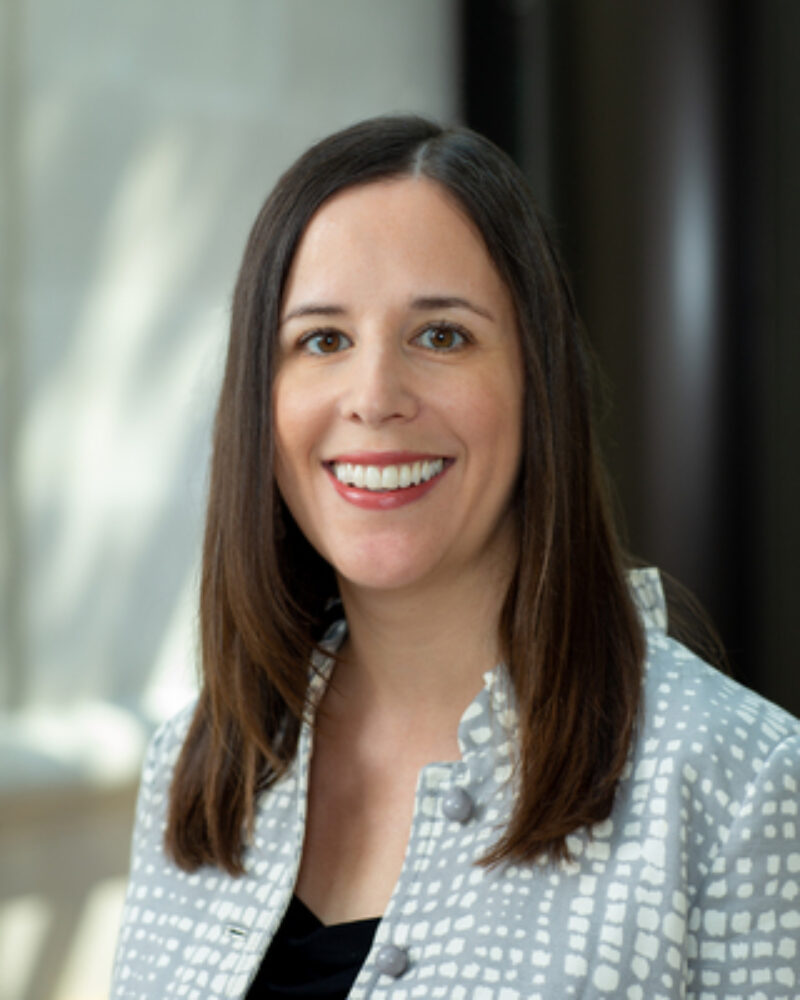
Elizabeth Sepper’s formal title is Professor of Law, but it could also just as well be Professor of Gray Areas.
With a focus at the intersections of equality, healthcare, and religious rights, Sepper’s extensive scholarship probes the ambiguities and potential conflicts among these subjects.
“I don’t think I fit in a box. I’m a bit of a chameleon,” says Sepper, who has been teaching at Texas Law since 2019.
One thing is crystal clear: There’s no current shortage of material for her insights. “There’s so much going on in the areas I care about,” Sepper notes, such as religious liberty challenges to health and public accommodations laws.
Sepper’s recent scholarship centers around two topics: discrimination in public accommodations and state actors enforcing religious restrictions.
Public accommodations and the line between speech and conduct
Sepper has written extensively on how the history of antidiscrimination laws relates to current conflicts between these laws and the rights of free speech and free exercise of religion.
In 2022, Sepper, together with James Oleske of Lewis & Clark Law School and Joseph William Singer of Harvard Law School, filed an amicus curiae brief before the Supreme Court in 303 Creative, LLC v. Elenis. The case involves a web designer who sued the state of Colorado, claiming that the Colorado Anti-Discrimination Act violates the free speech rights of the company’s proprietor. The owner wishes to expand her web design services to wedding websites, but the law would require her to equally offer to design such sites for same-sex couples—a requirement she argued would unconstitutionally compel her to speak.
The amicus brief filed on behalf of Sepper and the other professors highlights the line that public accommodations cases have historically drawn between speech and conduct and argues that the law would permissibly regulate 303 Creative’s services offered in the commercial marketplace. “Public accommodations laws regulate conduct, not speech,” the brief states. “So long as they are content neutral, any incidental impact on speech generally does not raise First Amendment concerns.” By contrast, the brief explains, the First Amendment is implicated in the rare instances where a public accommodations law burdens the message of an enterprise that “is highly selective, is not engaged in commercial activity, and/or is engaged in an endeavor where businesses are customarily understood to be expressing their own message”—a standard the amici believe 303 Creative does not meet.
This builds on Sepper’s previous work, including a legal history of the campaign to prohibit sex discrimination in public places and a study of state court analysis of laws banning race discrimination.
Government hospitals as religious institutions
Sepper’s other recent work focuses on hospitals as religious institutions and the manner in which religious activity of a medical institution can be perpetuated through contractual obligations. For example, hospitals operated by religious institutions may adopt religiously-mandated limitations on care like refusals to carry out advance directives to remove life support. These are governed by extensive contractual provisions that may even stay in place after a healthcare facility is sold.
“When we think about [religious] institutions, we think that somehow they’re bringing people together behind shared beliefs or there’s something sacred about the role of religion,” Sepper says. “But instead in healthcare we’re talking about certain multibillion dollar health care entities … using asset purchase agreements, joint operating agreements, joint ventures to create religious identity.”
Sepper’s most recent research focuses on government entities that are bound by religious restrictions in healthcare. Her work identifies state universities that own or operate hospitals whose stated mission is to further church teachings. “Those really strike at the heart of what we thought was our constitutional landscape,” Sepper says, “which is to say that the government isn’t allowed to operate religious institutions and that religious institutions aren’t allowed to make decisions for the government.”
Sepper writes about the convergence of state entities and religious institutions in Government’s Religious Hospitals, forthcoming in the Virginia Law Review. She also explored the contractual frameworks of healthcare facilities operated by religious institutions in a 2018 article in Northwestern University Law Review on Zombie Religious Institutions.
At the center of the state … and the debate
Sepper didn’t always envision herself a professor. She went to law school because she was interested in international human rights. Along the way, she discovered that she enjoyed litigation, which led to work for human rights organizations including Human Rights Watch and the N.Y.U. Center for Human Rights and Global Justice. Eventually, she found that academia was the right venue for her scholarly focus and background.
“I ended up backing into academia and that’s what I always tell my students: You can start out with a strategy and find out you end up in a totally different place or you can sort of feel your way through,” she says. Though, she notes, “I don’t think it came as a surprise to anyone that I became an academic.”
When Sepper was applying for her current position at Texas Law, she recalls hearing that its students are the happiest law students in the country. Throughout the past three years, she says, the happy students thesis has proven true, though her enthusiasm for the law school does not rest on this foundation alone. “Texas [Law] is really exciting because it’s placed at the center of the state and in the middle of some of the most important policy and legal debates,” she says.
And with her curiosity and interests at the intersections of perennially challenging subjects, Sepper also will remain at the center of many important conversations.
